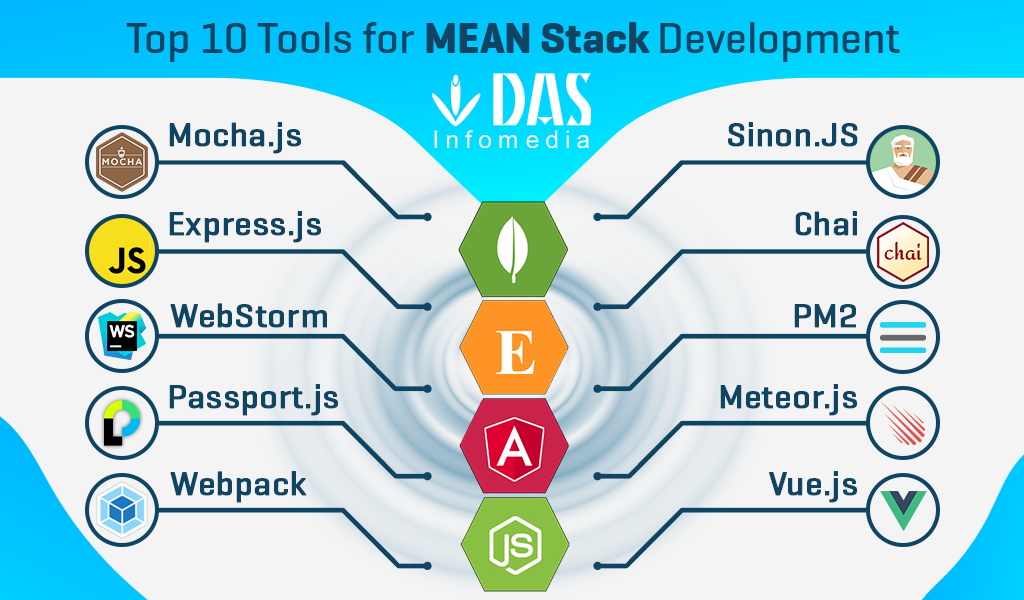MEAN is a free and open-source JavaScript software stack for building dynamic web sites and web applications. MEAN is a very simple and easy to use, single language for both back end and front end while in other technologies, there are different languages used for front and back end. This not mean MEAN dominates other languages, but it certainly gaining huge interest within developer community recently.

Let’ Check all popular Mean Stack tools:
Mocha.js:
Mocha.js is a JavaScript test framework based on Node.js. It makes you examine both in the console and in the browser. You can use this really quick testing suite to do the unit and addition testing plus it works for TDD (Test-Driven Development) and BDD (Behaviour Driven Development) perfectly.
Express.js:
Express.js is a must-use minimalist framework for Node.js web applications. A combination of Node.js and Express.js makes you build software with JavaScript on the server-side. Long story short, you could establish a whole website with those two: using Node.js to build the server-side part of the app and Express.js to publish the applications on your website.
WebStorm IDE:
WebStorm IDE is awesome for JavaScript. It is durable and it has everything you required to building Node.js applications on the client-side and server-side. It is one of the best attributes if you’re doing only JavaScript/HTML/CSS development – WebStorm IDE is a tool made for JS. You can do debugging, tracking, and unit testing with easy to the integration with Mocha.js.
Passport.js:
Passport.js is an authentication middleware for Node.js. It provides you a choice of over 300 different paths of authenticating your app including username and password model, login via Facebook, Google, Twitter etc., and many other. It’s absolutely easy to implement with any Express.js app.
Webpack:
The main role of Webpack is to bundle JavaScript files for usage in a browser. You can establish one or many bundles that are asynchronously loaded at runtime – this decreases the initial loading time.
Sinon.JS:
Sinon.js is a standalone testing framework for JavaScript. The great thing about is that it works with any testing framework. It supports stubs, spies, and mocks. It also supports most browsers (cross-browser support) and runs on the server using Node.js.
Chai:
Chai is a TDD and BDD assertion framework for Node.js which can be coupled with any testing framework (like Mocha.js we just mentioned). We use Mocha.js to run asynchronous testes, but Chai assists us to verify the test results. Chai can be run in a browser or with Node.js. As an assertion tool, we use Chai with its rich plugins (ex. chai-as-promised, chai-subset, chai-things). If we required to test Node.js HTTP servers, we usually use Super Test.
PM2:
PM2 is a process manager for Node.js applications. It’s easy to use and gives many useful built-in attributes (like load balancer or watch mode).
Meteor.js:
Meteor.js is a framework built for rapid prototyping of JavaScript apps and writing cross-platform code (Web, Android, iOS). It’s based on Node.js, integrated with MongoDB and you can use it with any JavaScript UI widget library. Even Y Combinator, the most influential startup accelerator, recommends this tool. While Meteor.js is great for prototyping apps, it’s good to keep in mind that it might not be the best solution for maintaining the already finished ones.
Vue.js:
A best substitute for those who use Angular.js is Vue.js. If you don’t want to make a complex web app and have to configure routings, controllers and services then Vue.js could be the feasible solution you’re looking for. This framework is focused on a View Model – you get attributes of larger frameworks in a lighter version for your single page applications.
If you are searching for a Mean Stack Consultant for your project, hire Mean stack developers in India can help you fulfil your requirement. Get in touch by visiting our website or skype dasinfo 2.







